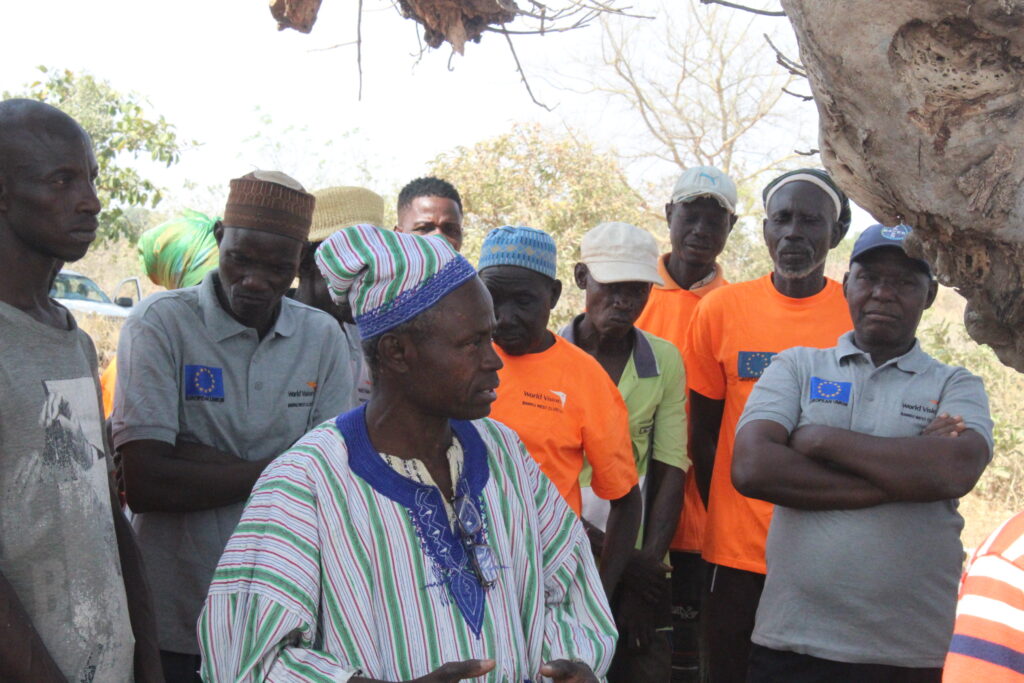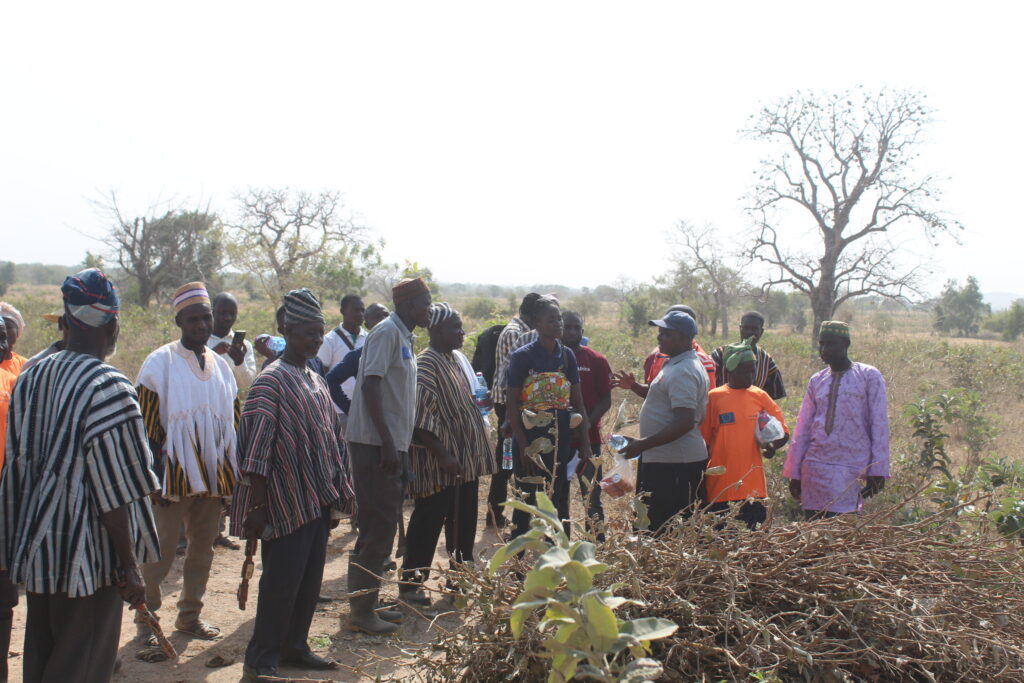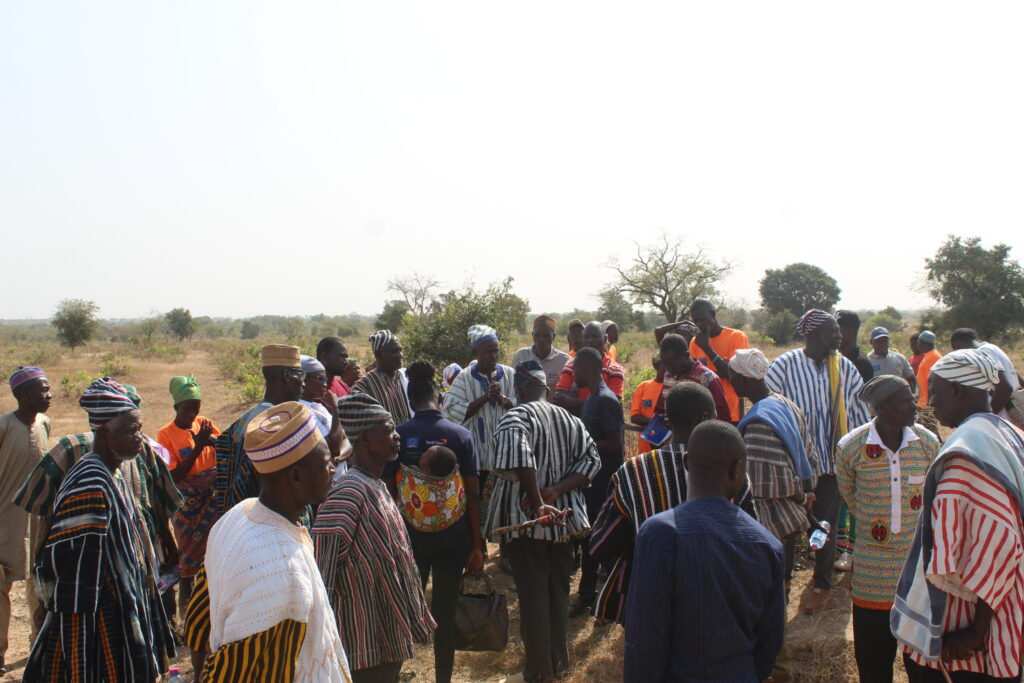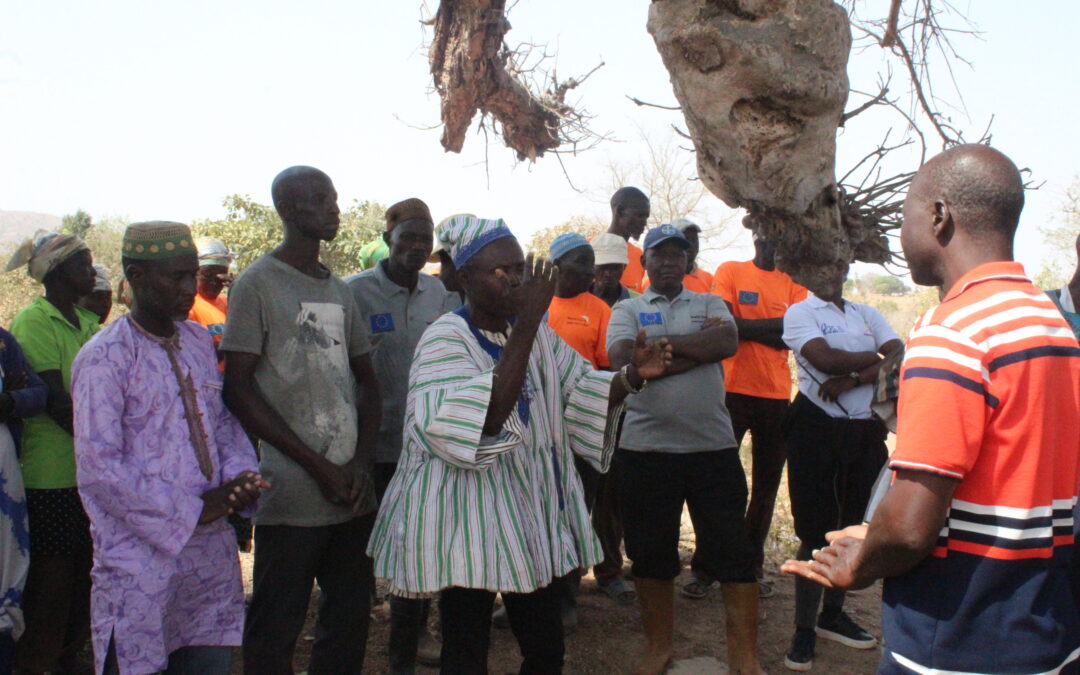By Regreening Africa – World Vision Ghana
Chief Edmond Bugri Bawah is an exceptional leader of the Googo community in the Bawku West district of Ghana’s Upper East region. His exceptional qualities are revealed in his interests and passions, which include his desire to see the environment flourish.
 Chief Edmond Bugri Bawah with elders in the Googo community. Photo: World Vision Ghana
Chief Edmond Bugri Bawah with elders in the Googo community. Photo: World Vision Ghana
However, this was not always the case. The Googo community was prone to frequent bushfires caused by human activity, which deteriorated the environment. There was indiscriminate cutting of trees for charcoal production as well as poor agricultural practices.
“Bushfires were rampant during the holiday season from October to February, when it was extremely dry,” he says.
The community also illegally extracted sand for sale among community members and to neighbouring communities. Sand extraction left large ditches all over the community. As a result, the soil profile was damaged, exacerbating environmental degradation in the community. This also resulted in the destruction of many trees as well as numerous cases of women and children falling into these ditches and being injured.
Uncontrolled bush burning, unsustainable logging, overgrazing, and small-scale mining all contribute to the degradation of agricultural and forest lands, resulting in dramatic climate variability. Floods, droughts, bushfires, and storms have led to decreased soil fertility and agricultural yields.
As a community leader who didn’t want the land in his community to get worse, Chief Edmond Bugri Bawah welcomed the Regreening Africa project interventions in 2018, when World Vision Ghana asked his community if they would like to engage. Through the project, they received training on controlling and preventing bushfires as well as sustainable regreening practices such as Farmer Managed Natural Regeneration (FMNR). Not to work alone, he also engaged the elders in the community in ensuring there was a paradigm shift from degradation to restoration using FMNR and tree planting.
 During an exchange visit, a religious leader explains how readily available firewood is in their FMNR field. Photo: World Vision Ghana
During an exchange visit, a religious leader explains how readily available firewood is in their FMNR field. Photo: World Vision Ghana
World Vision Ghana collaborates with local communities to identify degraded land areas for restoration using FMNR techniques. Usually, these areas have been degraded by previous mining (sand extraction), bushfires, excessive logging, or grazing.
Equipped with knowledge, Chief Bawah, along with the community’s elders, religious leaders, herdsmen, hunters, and school heads, encouraged the community to prune and nurture shrubs, as well as plant trees. They also drafted bylaws to protect the environment. Some of the bye-laws included a spot fine of GHC 50.00 (USD 5) and the planting of ten trees for indiscriminate tree cutting, and a minimum of GHC 100.00 (USD 10) for starting bushfires or depending on the magnitude of the damage caused.
World Vision Ghana works with the government to prevent bushfires by establishing fire belts and educating the public about the dangers of fire. Bushfire management committees also assist communities in learning about bushfire prevention and management. In addition, they collaborate with the environmental management committee to manage bushfires.
Chief Bawah further divided the community into four sections and entrusted the areas under restoration to volunteers to monitor for trespassers who would indiscriminately cut down trees or set fire to bushes. Through the project, community volunteers were trained in tree care, including pruning and culling. The Ghana National Fire Service, which is supported by the project, also trained them in bushfire prevention, fighting, and control.
As part of the bylaws, fines levied against offenders are used to motivate the volunteers. The fines are either used to purchase working tools such as cutlasses and boots or they are deposited into bank accounts, which must contain at least GHC 600 (USD 60). Additionally, after talking with the elders, the chief gave each of the four groups of people an acre of land where they could dig for sand to sell or use at home. Every year, during the dry season, the volunteers create fire belts around the community forests and report their activities to Chief Bawah.
During the dry season, World Vision Ghana also engages lead farmers to work with fire volunteer groups to establish fire belts to protect community forestland and cropland from bushfires. According to Chief Bawah, the community has been free of bushfires for four years. There are also fewer casualties, which were commonly experienced by women and children falling in the open ditches after sand extraction. The community is once again seeing the emergence of indigenous plants and wildlife that were on the verge of extinction.
The exemplary leadership of Chief Bawah has brought a lot of praise to the Googo community. The Googo community has carved a niche for itself in the scheme of sound environmental management, to the point where it has become a learning hub for NGOs, farmers, and traditional leaders in Northern Ghana.
 Chief Bawah invites traditional leaders from the Northern region to the Googo community to learn from the success of the community’s restoration. Photo: World Vision Ghana
Chief Bawah invites traditional leaders from the Northern region to the Googo community to learn from the success of the community’s restoration. Photo: World Vision Ghana
Regreening Africa is a five- and half-year programme (2017-2023) funded by the European Union that seeks to improve livelihoods, food and nutritional security, resilience to climate change, and ecosystem services through evergreen agriculture. In Ghana, the programme is implemented by a consortium of international NGOs, including World Vision as the country lead and Catholic Relief Services (CRS) as implementing partners to World Agroforestry (ICRAF).
In Ghana, Regreening Africa addresses pressing challenges to the savanna areas, such as acute and prolonged dry seasons, overgrazing (livestock pressure), rampant bush burning, and indiscreet felling of trees, culminating in declining forest cover, loss of indigenous biodiversity, and decreased soil fertility. Regreening Africa’s goal for Ghana is to improve livelihoods, food security, and resilience to climate change among smallholder farmers and restore ecosystem services by scaling the practices of evergreen agriculture. Regreening Africa’s implementation plan for Ghana includes community mobilisation, radio campaigns, stakeholder capacity building, partner implementation of field activities, multi-stakeholder engagement, campaigns, and advocacy, and support for alternative ways to make a living. Regreening Africa has achieved notable success by training farmers in FMNR and bushfire management, introducing S4T interventions, and and developing business plans.
This story was produced with the financial support of the European Union. Its contents are the sole responsibility of Regreening Africa and do not necessarily reflect the views of the European Union.

